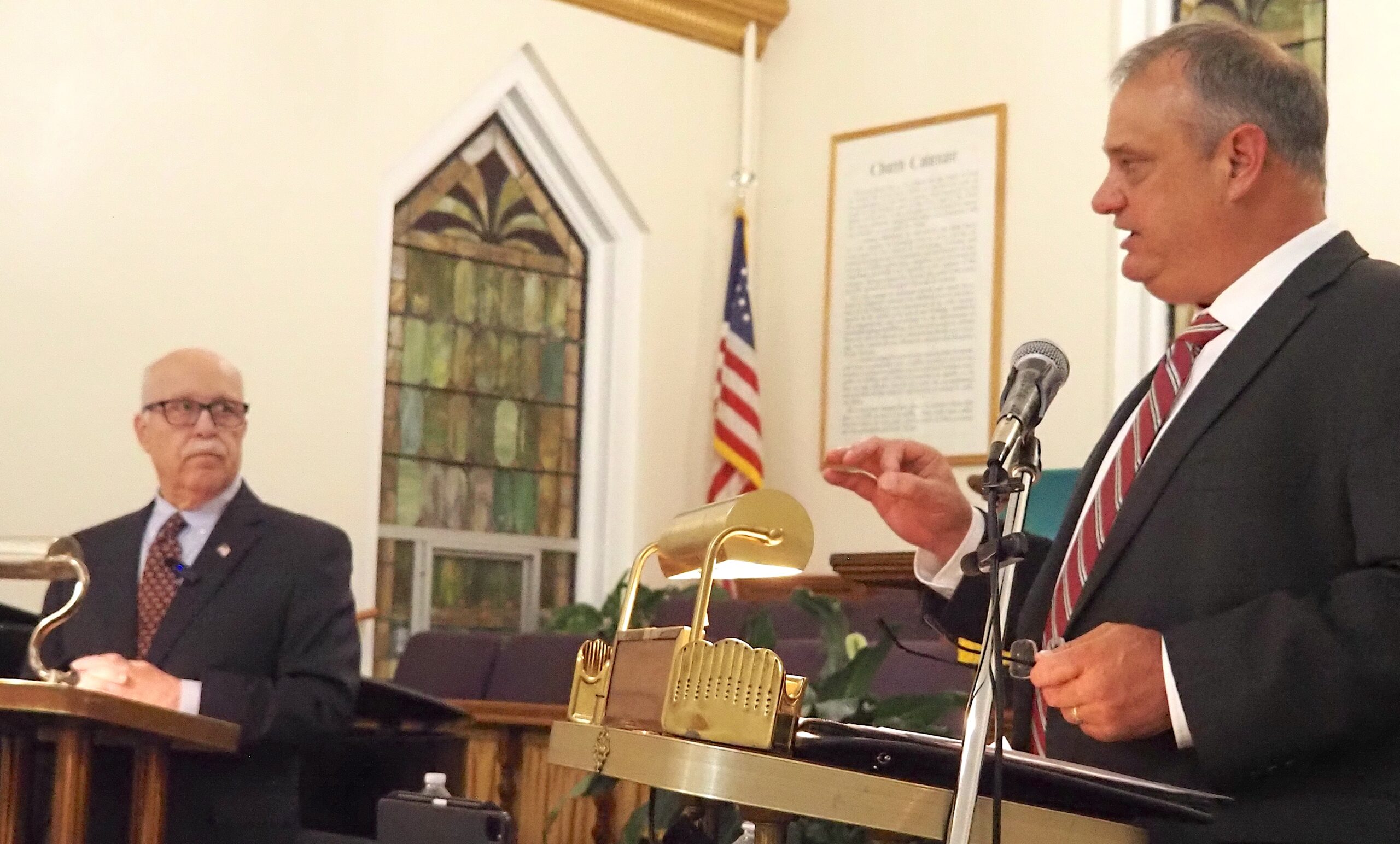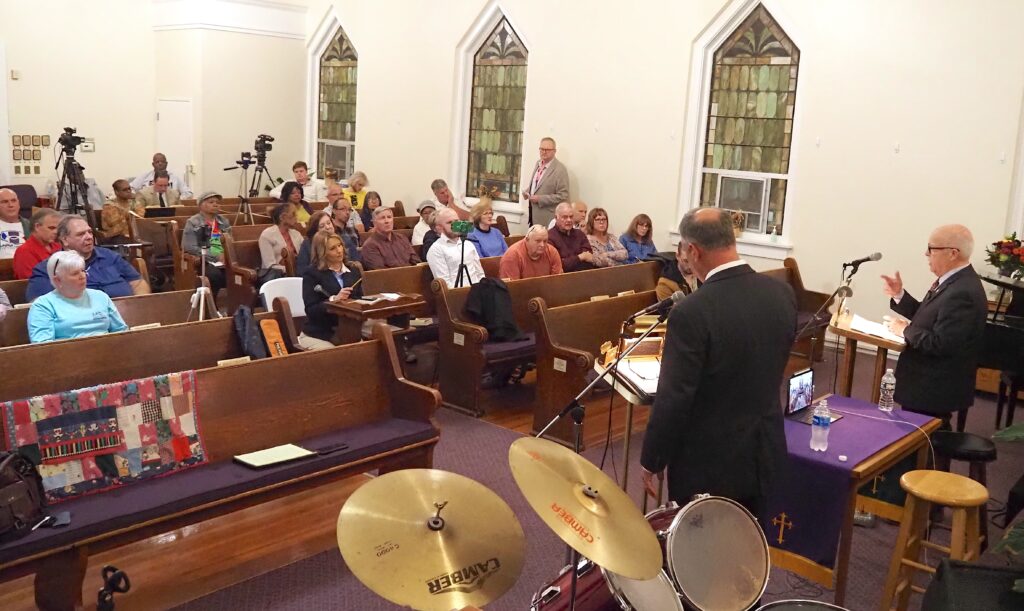Republican candidates disagree on cause of City Council communication troubles during Tuesday debate

QUINCY — Both Republican candidates for mayor of Quincy agreed that a lack of communication is the Quincy City Council’s biggest problem.
Exactly who creates that lack of communication was one of the more hotly contested topics of Tuesday night’s debate at First Baptist Church.
Incumbent Mike Troup and challenger Dan Brink answered questions from moderator Rajah Maples from WGEM during the debate, which lasted about one hour and 15 minutes before a crowd of about 50 people.
Voting for the Republican primary is scheduled for Feb. 25, with the winner taking on independent candidate Linda Moore in the April 1 municipal election.
When Maples asked about the biggest problem facing the Quincy City Council and what should be done about it, it was Brink’s turn to answer the question first. He immediately reminded those in attendance of the City Council’s vote of no confidence in Troup on July 9. Voting in favor of the resolution were aldermen Greg Fletcher (R-1), Jeff Bergman (R-2), Dave Bauer (D-2), Kelly Mays (R-3), Mike Farha (R-4), Richie Reis (D-6) and Jake Reed (R-6).
Brink, an alderman in the 6th Ward from 2009 to 2017, said it was the first time in city history that such a vote happened.
“That’s significant,” he said. “I’m the only person who understands what it was like to be an alderman and the information that they need to be successful and be good citizens for everybody. I want to develop a team approach with the City Council. It’s not the City Council versus the mayor. It’s us. I want to work together. We can work together with everybody. To me, that’s providing the leadership of how we can go about doing that.”

Brink then listed what he termed “examples of lack of leadership” from Troup, such as Farha calling for Troup to resign in April 2023 and Bergman telling Troup that “people aren’t calling you because they don’t trust you” during a June 18, 2023, City Council meeting.
“People who are watching the City Council see it advertised in the media … all the conflict that happens week in and week out,” Brink said. “There’s talk about the roundabout and the insurance debacle. There’s so many. One of the things he said is that he told the current fire chief (Bernie Vahlkamp) that he wasn’t qualified as a top candidate. Those things need to change, and those will not come out of my administration.”
Troup replied by saying taxpayers can approach two aldermen in the city’s seven wards with issues they have with the city.
“I think (that method has) proven out over the years to be very strong,” he said.
Troup then said the public expects to have dialogue on every issue during City Council meetings, but the aldermen don’t like to discuss city business during open sessions.
“(The aldermen) prefer to go after the council meeting to get a drink with other friends, then talk about what should have happened or what they wanted to do,” Troup said, “We get more discussion (during) a committee meeting than we do out of the City Council. The way the government is structured, people want and expect open dialogue in open sessions. We need to get back to that.
“The no-confidence vote … that essentially was grandstanding by a handful of aldermen. The city changed the health insurance plan. We maintained the benefits to our employees, and you know, under any change like that, it can be frustrating. There’s challenges. We work through all of the issues. All were resolved, and in the end, two aldermen who actually voted said it was a mistake to take the vote like they did. Without just one of those two votes, that motion would have failed.”


When Maples moved to the next question about pay inequity for men and women, Brink used the first part of his reply to respond to Troup’s previous answer.
“He’s blaming the aldermen,” he said. “It’s not the aldermen versus the mayor. It’s one unit. I want to be able to work with the aldermen and not blame them. You know, when I was an alderman for eight years, we had debate all the time. We would love to debate. If you go back and watch some of those meetings, we debated pretty consistently, and we kept it open for everybody to understand why these decisions were made.”
Both candidates came out swinging in their opening statements. Troup said Brink’s time as an alderman “did not show positive leadership or growth in Quincy.” Brink said he would build on what has worked in the past and “discard what has caused chaos and conflict.”
When the candidates were asked why they were best suited for the job as mayor, Brink said he was part of a team that helped get three Republican aldermen elected in 2011, shifting the City Council from a 7-7 split to a 10-4 Republican majority. When Brink was re-elected as an alderman in 2013, Kyle Moore also ousted Democrat John Spring to give control of the mayor’s office and the City Council to the Republican party.
“I believe that we had a positive cash flow because of our conservative fiscal values,” he said. “We created a balanced budget, created 10 percent reserve funds and structured the budget in such a way that we set the city up for future success.”
Brink said the city’s finances were in “great shape” when Troup was elected in 2021.
Troup said Brink’s response was “hard to listen to.”
“Over the last 10 years, Dan Brink has done more to help campaign against Republicans, for Democrats and independents, than he has to actually represent Republicans in whatever the race is,” Troup said. “So let’s talk about how well he’s equipped the city and my administration.
“When I took office, he forgets that he was part of kicking the can of the unfunded fire and police pension. When I came into the office, it was $100 million unfunded because prior administrations didn’t want to deal with it. When we get a credit card statement, you have two things. This is the balance due, and this is the minimum payment. They decided to pay the minimum payment. They even went out and paid another actuary to come up with, ‘Can I pay even less than what (the minimum) is?”
Troup said those decisions have cost taxpayers money and that Brink wasn’t truthful when he said he left the city in “good shape.” He said the city has 100 miles of roads with water distribution lines that are more than 150 years old. He said he’s the first mayor to work with department heads and the City Council to address the city’s failing infrastructure.
“Where were you back when you were an alderman?” Troup asked Brink.
Asked how he would relate to the people who struggle from paycheck to paycheck, Troup said providing more education and training was important.

Brink then chose to respond to Troup’s comments about the city’s infrastructure, showing those in attendance a flyer promoting Troup’s candidacy. It included a chart showing less than $50 million in yearly spending on infrastructure from 2016-2020. Then during Troup’s term, it showed expenditures of nearly $250 million in 2021, followed by about $60 million in 2022, more than $100 million in 2023 and nearly $150 million in 2024.
“That’s $550 million,” Brink said.
“That’s been corrected,” Troup said of the flyer.
“I like the history of the finance of the city, but where did you come up with $550 million?” Brink said.
“That’s been updated,” Troup said.
“So this is a mistake?” Brink said, holding up the flyer.
After Troup said yes, Brink said, “So what have you done to correct this?”
“We have an updated flyer,” Troup said.
“Did you go back and circulate it to the doors that you already put it on or the mailboxes you already put it in?” Brink said. “… At end of the day, the facts matter. … You wonder why you have a conflict between the aldermen and the mayor’s office. These are the kind of reasons why there’s a conflict. That’s why an alderman said, ‘People don’t call you because they can’t trust you.’ You put this information out there, and it’s not true. You did nothing to correct it.”
“Yes, we have,” Troup said.
“Was there any public statement?” Brink said.
Troup explained after the debate that the information on the vertical axis of the bar chart was incorrect in the “first couple of hundred” flyers circulated by his campaign staff in September.
“We’re going back to do another drop in those same neighborhoods,” he said.
Asked what was the biggest issue facing the city, Troup said the housing shortage, while Brink said the city’s deteriorating streets. The candidates also gave their views on the city’s fix-or-flatten program, how they would create affordable housing, increasing diversity in leadership roles, reducing local sales taxes (both were against it), their thoughts on partisan versus non-partisan elections and how quickly street repairs could be done.
When asked how their approach is different from the other candidate, Troup said Brink has only hinted at what he will do as mayor.
“You can look at the last three and a half years and see what I actually did, what did I bring to the council and what did we get approved through the City Council,” Troup said, pointing out that Target, Amazon and United Alloy are among some of the employers who have come to Quincy during his first term as mayor.
“There are some significant growth issues that have benefited all the taxpayers in Quincy, and … there’s so much more that we can do as a community to grow, to add more businesses, bring more employers into the community. That’s something else I’d like to continue to work on.”
Brink said the biggest difference was “I” versus “we.”
“He’s I. I’m we,” Brink said. “I want to work together with everybody. It’s not what I did. Don’t look at me. I want to be humble and recognize everybody who contributed to a team approach.”

Miss Clipping Out Stories to Save for Later?
Click the Purchase Story button below to order a print of this story. We will print it for you on matte photo paper to keep forever.

